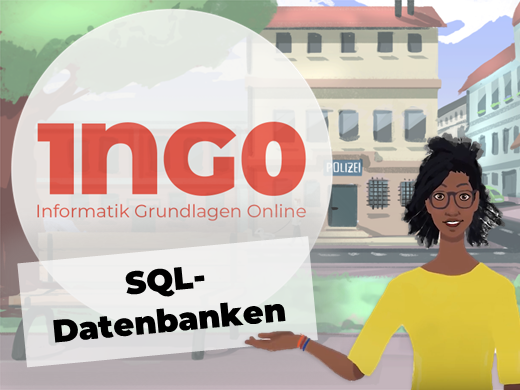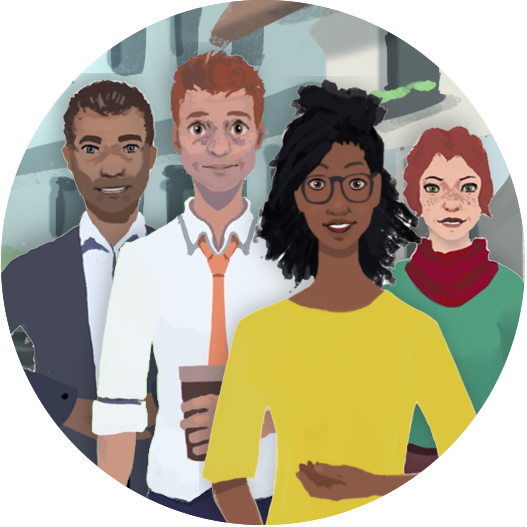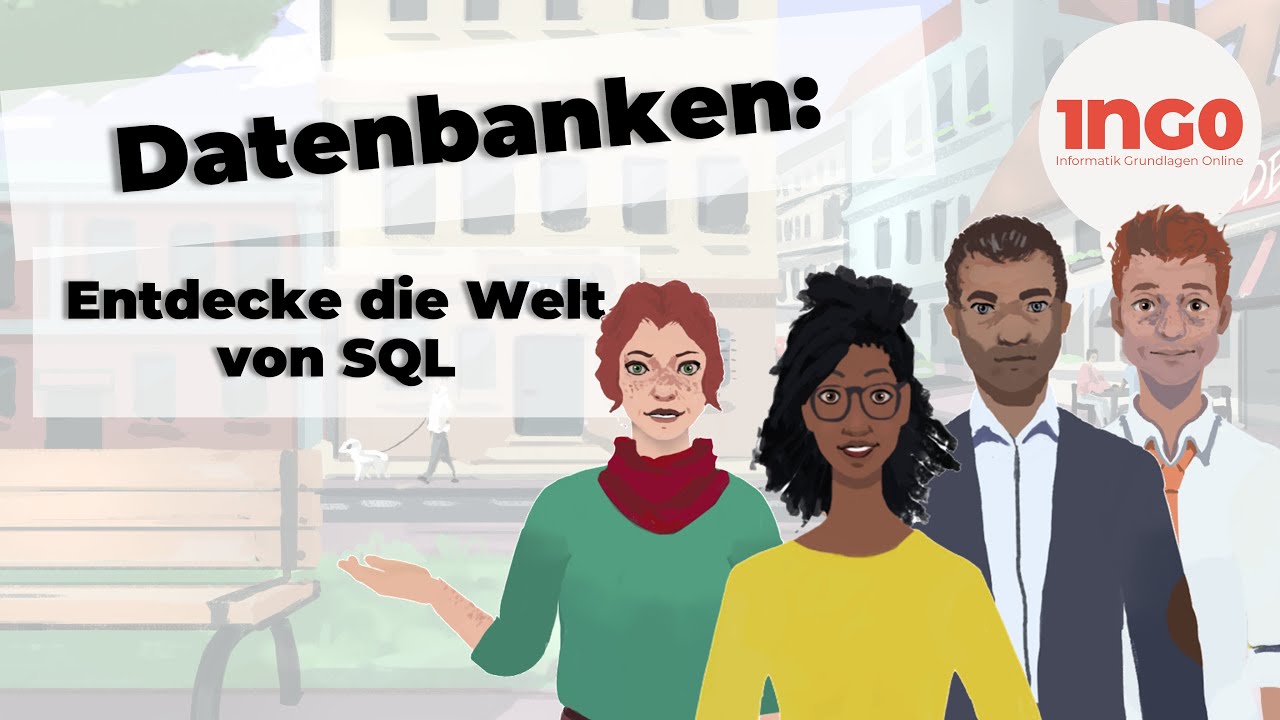


Databases: Discover the world of SQL
University of Klagenfurt
Claudia Steinberger, Nina Lobnig
O kursu
Video najava za Databases: Discover the world of SQL
Opći podaci o kursu
#Datenbanken #SQL #Informatik
In this course, you'll find all kinds of stuff about working with SQL databases - from a brief introduction to relational databases (what and why?) to mathematical basics (like Relational Algebra) to the more prominent topic of SQL. We take a closer look at how an SQL database is created and how to write queries for retrieving stored data from it. Learning how to write multiple SQL queries forms the central part of this course.
Dive into the world of databases, and learn content through stories! Animated characters explain the content and its use in concrete problem situations and take place in a police department and a local bakery and are always database-related. The contents cover the implementation and operation of an SQL database (as parts of the life cycle of a database), starting from an already existing design (being a relational model). The criminal case database is used frequently, e. g. by the two police inspectors to solve criminal cases, do administrative work, and much more.
The idea behind this course is to move away from a typical teaching setting with recorded lectures towards active learning. Videos are therefore underpinned with H5P elements to increase interactivity and strengthen knowledge straight away. The associated tasks are also designed in an exciting way and embedded in stories. Help our two inspectors to apply what you have learned and show what you can do!
Our content, such as videos, interactive books, PDFs, and more, is designed for everyone: pupils, students, and anyone else who is interested.
Additional note:
The tasks for SQL queries are also included in aDBenture (adbenture.aau.at) and can directly be played there; the link is attached to the respective tasks. However, the tasks can also be solved with a local database instance. We work with the standardized SQL commands as they are usable in several database management systems; in cases where this was not well possible, we use the syntax of PostgreSQL.
Sadržaj
Sadržaj kursa
What can you expect in the course? What content will be covered?
You can get a brief overview in the video above.
Structure of the course:
The MOOC is divided into several lessons - that's nine informative steps into the world of relational databases, focussing on SQL:
Lesson 1: Overview of the MOOC's goals, content, and working methods
Lesson 2: Introduction to the world of databases and SQL
Lesson 3: Relational Algebra as a theoretical foundation
Lesson 4: Creating an SQL database
Lesson 5: Simple SQL queries
Lesson 6: Working with different datatypes (numbers, strings, dates)
Lesson 7: SQL queries across multiple tables (joins)
Lesson 8: Groups and aggregate functions in SQL queries
Lesson 9: Queries in queries (simple and correlated subqueries)
Note: The above learning time per lesson is estimated, and results if all topics and in-depth examples (tasks) are worked through entirely in the lessons. With appropriate prior knowledge, this can be significantly shortened. It is also possible to only take single lessons or single content. In this case, however, no certificate can be provided.
Ciljevi kursa
- Know essential terms related to relational databases
- Know the properties of SQL, its command categories, and the advantage of standardisation
- Understand expressions in Relational Algebra and read and formulate simple queries
- Understand and apply logic in context (linking statements with AND, OR, NOT, etc.)
- Set up a database on a relational database system (with SQL)
- Query information from individual tables with SQL
- Dealing with different types of data in SQL queries
- Query information by joining multiple tables
- Group data and use aggregate functions (e. g. to calculate max, min, average)
- Create simple and correlated subqueries
Predznanje
No special prior knowledge is required for this course. This excludes ordinary computer skills, as well as related software (including downloading and installing software) and using web applications.
Način provođenja kursa
Each lesson starts by outlining the key content that will be covered in the lesson and questions that can be answered after the lesson is complete. If we suggest an exercise environment in a lesson, there is also detailed information about it before things get started. Depending on the scope, a lesson consists of one or more topics.
In this MOOC, we follow a particularly applied learning approach (with a fictional police department and bakery). Therefore, topics usually start with a practical question, which is intended as a challenge and should be able to be solved after working through the topic. If the necessary competencies are already available due to previous experience, this will become clear already at this point.
For each topic, we offer learning objects that convey basic knowledge about a topic (what I should know about the topic) or show the application of this basic knowledge by means of examples (application examples) and also tasks for applying what has been learned. These can be short videos (with characters from our police department), interactive books, or texts. The order of the learning objects is technically sequential but can be consumed as needed.
Each lesson concludes with a lesson quiz. 75% of the required points are necessary for the positive completion of the lesson (and the certificate at the end).
Certifikat
For actively participating in the course you will receive an automatic certificate which includes your username, the course name as well as the completed lessons. We want to point out that this certificate merely confirms that the user answered at least 75% of the self-assessment questions correctly.
Na društvenim mrežama
Voditelj kursa
Claudia Steinberger, Nina Lobnig
This MOOC was funded by the bmbwf as part of the eInformatics@Austria project (Digital and Social Transformation in Higher Education, 2020-2024). The aim of the project is to develop MOOCs for teaching Computer Science Basics Online (1ngO) and this course covers part of the topic 'Databases and Logic', which was created by the project team from Klagenfurt.The main authors are Claudia Steinberger and Nina Lobnig, who were actively supported by their colleagues.
We recommend completing the MOOC "Designing a Database: Starting from an Idea to a Relational Data Model" in advance to gain a deeper understanding of the content covered in the course. Nevertheless, the course is designed to be stand-alone and can also be completed without prior knowledge.

Sam Winter, Peter Rede, Lara Fischer and Amar Kovač
Our fictional characters Sam Winter, Peter Rede, Lara Fischer, and Amar Kovač, will guide you through the course, presenting the content both in theory and in practice as well as illustrating it with examples.
Sam Winter (pictured in the middle) is an expert in databases and introduces the various topics, explains all the essential details, and also demonstrates the content using examples. She often brings examples from her favorite bakery, which she supports in the implementation of a new database, as well as from the police department, with whom she also cooperates.
Peter Rede (mid-left in the picture) is also an expert in databases, especially in the area of mathematical fundamentals and several query languages. In the course, he is particularly involved in relational algebra as well as tuple and domain calculus.
Contributors to the conception and production of the MOOC and its content (all coming from the University of Klagenfurt, listed alphabetically):
- Nicole Burgstaller
- Nina Lobnig
- Michael Morak
- Claudia Steinberger
- Claudia van der Rijst
- Anna-Sophie Wallner
- Aron Wedam
- Markus Wieser
- Andreas Bollin (didactic consulation)
The characters, backgrounds and objects were specially drawn and animated. The people involved in this:
- Jan Jancik (consulting, rigging, intro and outro)
- Stefan Pesendorfer (consulting as well as drawings)
- Wolfgang Neipl
- Nessa Heschmat
Questions or comments?
Feel free to engage in the course forum or send us an email at: 1ng0@aau.at
(Attention: The mail address contains two numbers).
Prijavi i upiši Trenutno: 463 Učesnici
Besplatno za sve € 0.00
Partneri
 bmbwf
bmbwf
Dieser MOOC wurde vom bmbwf im Rahmen des Projektes eInformatics@Austria(Digitale und Soziale Transformation in der Hochschulbildung, 2020-2024) gefördert. Ziel des Projektes ist die Entwicklung von MOOCS zur Vermittlung von Informatik Grundlagen Online (1ngO) und dieser Kurs deckt einen Teil des Themas 'Datenbanken' ab.

University of Klagenfurt
Klagenfurt
